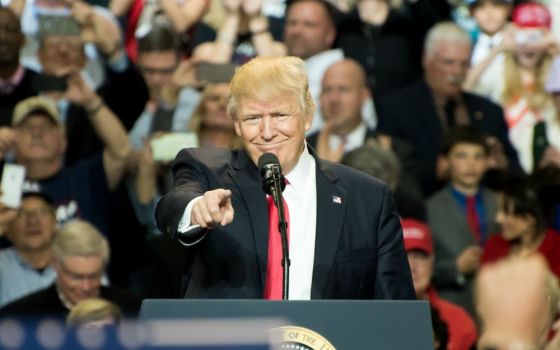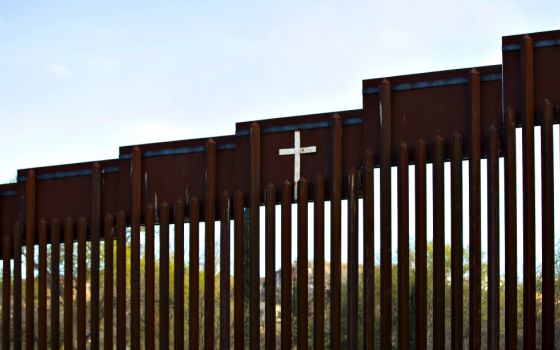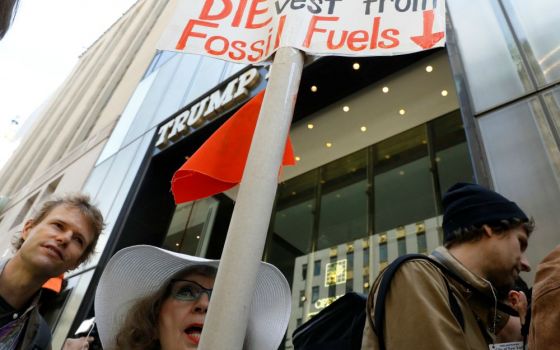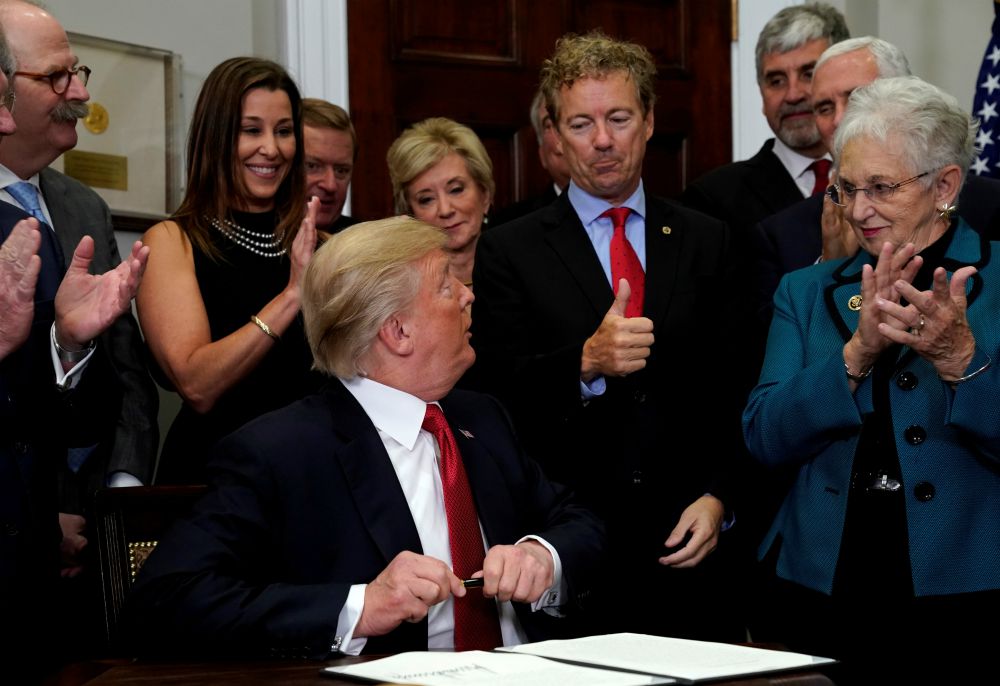
President Donald Trump looks at Sen. Rand Paul, R-Ky., at the White House Oct. 12 after signing an executive order that loosens certain regulations in the Affordable Care Act to allow small businesses, trade groups, unions and self-employed individuals to join together and form associations to cheaper bare-bones health insurance plans. (CNS/Reuters/Kevin Lamarque)
Not since Richard Nixon's presidency has anyone really had to worry about the vitality of our nation's Constitution. Nixon flouted the law of the land and the norms of democracy, and the Constitution worked and won. The House was preparing to vote on articles of impeachment when Nixon resigned in disgrace. We subsequently learned that he had kept a list of people in the press whom he considered "enemies," even as all presidents have a somewhat adversarial relationship with the press corps. The press also had won, its investigative reporters unearthing the details of the Watergate cover-up that led to the special congressional committees' investigations.
How has the Constitution fared in the 12 months since Donald Trump won the presidency? That is the question I pose today as part of NCR's on-going election anniversary coverage.
On the one hand, the Constitution has done pretty well. A week after his inauguration, Trump promulgated a travel ban that targeted only Muslim nations. During the campaign, he had promised to do precisely this. Within hours, protesters flocked to airports and several courts delivered a temporary injunction against the ban. Last month, the U.S. Supreme Court dismissed the case it had agreed to take regarding the travel ban because that case was no longer operative: The president had issued a revised travel ban that needed to be litigated. The litigation is again working its way through the courts, and it remains to be seen if it will pass constitutional muster.
As Trump tried to push legislation through Congress that would repeal and replace the Affordable Care Act, the Constitution again served as a bulwark against reckless policy. The House passed a bill, but in the Senate they failed multiple times to garner the necessary 50 votes. Sen. John McCain was one of those brave Republicans who opposed the final attempt, calling on the Senate to return to regular order, hold hearings, draft the legislation in committee, etc. Senators Susan Collins (R-Maine) and Lisa Murkowski (R-Alaska) also opposed the bill: Alaska had undertaken the Medicaid expansion that would have been repealed under the law, which largely explains Murkowski's vote, and Collins simply did the right thing though her state of Maine had not voted to expand Medicaid.
The separation of powers is one of the cornerstones of our democracy and, in these two cases, at least so far, the courts and the legislature functioned as a check on the president. Of course, McCain is fighting brain cancer, and if he were forced to leave the Senate, a new senator might vote with the majority of Republicans to repeal the Affordable Care Act. And there is no knowing how the Supreme Court will eventually rule on the travel bans.
Advertisement
The investigation into collusion between the Trump campaign and the Russian government is another area where, so far, constitutional norms have withstood the president and his threats. The independence of the Justice Department is essential to the rule of law, and Trump's firing of FBI Director James Comey, though legal, potentially compromised that independence. Attorney General Jeff Sessions was forced to recuse himself from the probe after he lied to Congress during his confirmation hearings about his own meetings with Russian officials during the campaign. The appointment of former FBI Director Robert Mueller to lead the probe was an affirmation of the department's commitment to a genuinely independent inquiry, and the indictments handed down last week certainly give substance to the affirmation. Trump will continue to try and undermine Mueller's integrity, which is shameful and probably counter-productive, but if he fires Mueller, the nation will face a constitutional crisis akin to that faced when Nixon fired special prosecutor Archibald Cox, as well as Attorney General Elliott Richardson and Deputy Attorney General William Ruckelshaus, when both men refused to fire Cox. Then, Republicans in Congress rebelled against the White House. There is no indication that today's congressional leaders would react with equal vigor.
Perhaps the most damage done to the Constitution this year has less to do with any specific flouting of the rule of law than the president's general disregard for that rule, and for the constitutional and democratic norms that make the rule of law possible. The First Amendment guarantees a free press, but more than the words on the page, a certain respect for the press is necessary is presumed by that amendment. All presidents have a testy relationship with some or all of the members of the press corps. We know now that Nixon kept an enemies list of reporters he despised. But Nixon did not regularly and publicly demean the press, accuse them of publishing falsehoods, and question their patriotism as Trump does all the time. The fabric of a democracy is more than the words in the Constitution, and Trump is ripping that fabric apart. It is dangerous. It is also taking a page from the playbook of fascist dictators.
Some may argue that Abraham Lincoln ran roughshod over parts of the Constitution when he was president, and that is certainly true. But we are not engaged in a Civil War and, besides, Trump is no Lincoln.
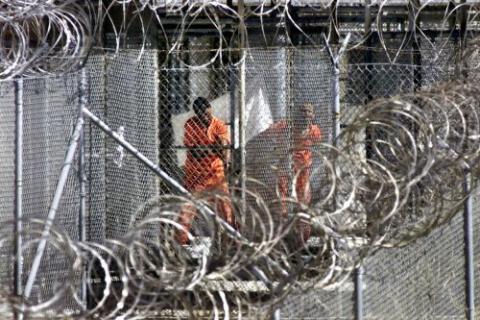
Alleged al-Qaida and Taliban combatants captured in Afghanistan are seen in the detention center at Guantanamo Bay, Cuba, in this Jan. 27, 2002 file photo. (CNS/AP Pool via EPA)
Trump is reckless with the rule of law in other ways. After the terrorist attack in New York last week, he said he wanted to send the suspect to Guantanamo Bay. He had to back off that threat because, of course, it would be illegal to send someone arrested on U.S. soil to Gitmo. But, the casual way he made the suggestion illustrated a disregard, as well as a probable ignorance, of the law. And, as Ruth Marcus pointed out this summer, Trump's way of framing what are normal legal processes as attempts to overturn his election victory is itself an effort to undermine the rule of law.
The president should be careful because his election victory did point to one of our constitutional mechanisms that should be revisited and changed: the Electoral College. For the second time in five elections, the candidate who got the most votes lost. The ironic thing is that Trump was saved not only by a constitutional norm, one that has evolved: Originally, the idea of creating an electoral college was, in part, precisely to avoid a situation in which a candidate who won the vote through nefarious means, such as the influence of a foreign government, could become president. But, in practice, electors vote the way their states voted, and they did so in his case. That had become the prevailing democratic norm.
Of course, if the television show "Jeopardy" had a category named "Things Trump doesn't know," Alex Trebeck would need the whole board — and maybe a second board, too. The rest of us, however, must be attentive to the importance not only of the text of the Constitution but of those norms that make it work. We must defend them as we defend the Constitution itself. The man who took the oath "to preserve, protect and defend the Constitution of the United States" is today its greatest threat.
[Michael Sean Winters covers the nexus of religion and politics for NCR.]
Editor's note: Don't miss out on Michael Sean Winters' latest! Sign up to receive free newsletters, and we will notify you when he publishes new Distinctly Catholic columns.




